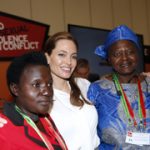Editor's Note: This blog post has been updated to reflect a correction on Kolbassia Haoussou's quote.
In the opening plenary of the Global Summit to End Sexual Violence in Conflict, I listened to speaker after speaker recount the pervasiveness of sexual violence in war and the toll it takes on survivors and communities. It made me wonder: how many rapes does it take before we make the world a place where all people live free – free from the fear of sexual violence?
The stories of the survivors, the calls to action by the advocates, and the promises of the politicians are all too familiar. As Zainab Hawa Bangura, the UN Special Representative of the Secretary-General on Sexual Violence in Conflict, said in her keynote address: the measure of the success of this summit will be in the actions taken in its aftermath. To date, in the vast majority of cases of sexual violence, survivors face multiple obstacles when seeking justice, starting with questions as to whether or not her story of violence is true.
When reports of sexual violence, both in times of peace and conflict, are denied, the crime is erased by silence – a silence that has been seen throughout the decades. For example, the Nuremburg and Tokyo Trials are the foundation on which the International Criminal Court (ICC) was built. But they did not provide justice for the nearly 200,000 women held in sexual slavery by the Japanese military during World War II. The silence continues as these victims are passing away without ever seeing justice.
Perhaps the most striking statement made in the opening plenary of the summit was by Kolbassia Haoussou, co-founder of Survivors Speak OUT, who said, “I'm not ashamed. I'm proud to be a survivor of torture to help find solutions. It's possible.” His statement is powerful and courageous and speaks volumes about how silence creates a culture of shame that undermines efforts to ensure justice for victims.
To be clear, there has been progress: both the international tribunals for Rwanda and the former Yugoslavia successfully investigated and prosecuted crimes of sexual violence. Fatou Bensouda, the prosecutor for the ICC, announced that initiating investigations and prosecutions in cases of sexual violence is a top priority for her office. The Program on Sexual Violence in Conflict Zones at Physicians for Human Rights is working with doctors, police investigators, prosecutors, and judges in the Democratic Republic of the Congo and Kenya to ensure the proper collection, analysis, and preservation of crucial evidence of sexual violence, which can then be used to support criminal prosecutions.
Securing evidence and properly documenting crimes are essential steps – particularly with regard to the issue of justice and accountability. But survivors and activists at this summit want more than just breaking the silence and ensuring justice for victims and accountability for the perpetrators. We want to stop such violence from happening in the first place, which brings us back to the fundamental question of what causes sexual violence and how it can be prevented.
There is no dearth of ideas. At one panel, a presenter talked about how many male perpetrators were themselves victims of sexual violence as children. Another speaker discussed the toxic mix of some forms of masculinity and war. At the plenary, another presenter asked how we have been able to explore outer space, but have not yet figured out how to ensure gender equality. Another speaker pointed out that people living in poverty were the mostly likely group to be targeted for sexual violence in conflict.
The issues are clearly complex, but political and military leaders cannot continue justifying inaction with the fact that there is no simple solution. We must all act to stop sexual violence now. The outcome of this summit will be measured by the actions taken not just by international and state-level leadership, but also by each and every one of us.

